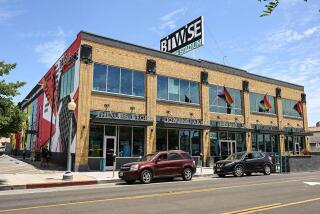False Financial Data Used in Bid for Parks Contract
- Share via
Mistix, the computer-ticketing company that makes reservations for campsites and Hearst Castle tours under a lucrative state contract, submitted a false financial statement to parks officials last year as part of its campaign to win the job, its president has acknowledged.
The false statement was submitted under penalty of perjury to officials deciding which firm should get the five-year reservations contract, worth an estimated $15 million.
The statement portrayed Mistix, a fledgling firm, as financially successful when it was not. It showed Mistix, in its first 16 months, with sales of more than half a million dollars and a handsome profit, when actually it had no sales and no profit.
The president, John W. Armiger, has said the sales and profits were projections from a deal Mistix was negotiating but had not signed. The deal later fell through, he said.
Armiger added that he told a key parks official orally that the deal had not closed. But the official has denied knowing that Mistix’s claimed sales and profits were tied to the deal.
How much the untrue reports helped Mistix to win the contract cannot be determined, but it is clear that they did help.
The key official, Charles R. Vogelsang, who reviewed bidders’ financial fitness for the parks department, has said his “gut reaction” from the financial statement was that Mistix was “doing pretty damn well for a year. . . . They had $500,000 sales and a healthy profit, which indicated to me they knew what they were talking about.” Mistix received maximum credit from parks department evaluators for financial ability.
Parks officials have said they were also impressed with Mistix’ computer software capabilities, and with its hunger for the job. They selected it as the “best responsible bidder,” even though it was also the highest bidder--by about $2 million.
Mistix president, Armiger, who signed the financial statement on behalf of the firm, acknowledged that it contained false information while he was testifying in June at an administrative hearing in Sacramento.
Armiger said the sales figure--$567,000--represented what he believed Mistix would make on a deal he expected to become final.
The deal, to set up computerized ticketing for New York’s City Center Corp., ultimately fell through, Armiger said.
The hearing, presided over by an administrative law judge, is the result of a formal protest lodged by Ticketron, long-time holder of the reservations contract, and low bidder for its renewal.
Ticketron contends that parks officials abused their discretion in selecting Mistix--a firm that had no track record, no ticketing clients and no outlets--to run a system that accounts for 1 million reservations a year, and brings in about one-sixth of the revenue of the state Department of Parks and Recreation.
Testimony has been concluded, but neither Mistix nor Ticketron has filed written arguments, and the judge is not expected to make a decision until January. If Ticketron wins, the judge will notify the parks department, which can reopen the bidding or ignore the judge’s recommendation.
Parks officials dumped Ticketron in part because they were disappointed with the quality of its service.
Mistix’ performance has also been questionable. Through much of the peak camping season this year, callers trying to make reservations have reported difficulty in reaching operators at Mistix’s toll-free lines.
In May, staff members for state Sen. Robert Presley (D-Riverside) decided to see for themselves how bad the situation was. They said they dialed 37 times in three days, and got through once.
Staff members for Assemblyman Eric Seastrand (R-Salinas) said a similar effort produced an even bleaker result. They estimated getting through three times in 150 tries.
“It’s been a real mess here because we have so many state parks and stuff in our district and Hearst Castle is in our district too,” said Seastrand’s administrative assistant, Leslie Ramsey.
Parks officials have said that the problem was a simple lack of telephone capacity. They indicated last week that it had been corrected. A public information officer, Larry Painter, said complaints are now “down to nil.”
In his testimony, a transcript of which became available July 29, Armiger denied trying to mislead parks officials by filing a false statement.
Acknowledging implicitly that he knew that the sales information was false when the statement was submitted, Armiger testified that he expected that it would become true when the deal with City Center went through.
The financial statement told in some detail what became of the $567,000 Mistix claimed in sales. About $350,000 had gone for “costs of goods sold.” After that was deducted, Mistix was said to have been left with $216,911 in gross profits. After other expenses were deducted, Mistix was said to have been left with about $100,000 in net profits.
The $216,911 gross profits figure also appeared on the statement as Mistix’s total accounts receivable, all of which were labeled current.
Armiger testified that he believes that he told Vogelsang, who heads the parks department’s accounting office, that the accounts receivable figure represented an expectation from the unsigned deal with City Center.
Vogelsang acknowledged knowing that the City Center deal had not been signed. But his testimony indicated that he did not realize that the figures in Mistix’ financial statement were tied to the City Center deal.
Considered ‘Past Income’
Vogelsang, for instance, referred in testimony to Mistix’s “past income,” and said that he took the financial statement at face value.
Asked specifically if he had ever discussed with anyone from Mistix “where they got that money, or where it came from,” Vogelsang testified that he had not.
Armiger and Vogelsang had a discussion about finances during a trip the parks official made to the offices of the various bidders--Ticketron, Ticketmaster and Mistix--in mid-November. Vogelsang was accompanied by Clark Woy, manager of the reservations system, and chairman of the parks department’s committee evaluating bidders.
Vogelsang said he was concerned that Mistix might be too weak financially to borrow the $1.8 million it figured it would need to carry out the reservations contract. He said he expressed that concern to Armiger and that Armiger told him and Woy that Mistix was negotiating with a publicly held company, G-TECH, to provide financial backing through a merger or buy-out.
Vogelsang recalled that he and Woy were asked to keep G-TECH’s involvement a secret to avoid any possibility of insider trading. They kept it a secret from their fellow evaluators.
Contract Transferred
G-TECH acquired Mistix in May, and the parks department transferred the contract to its name. G-TECH is an established firm that in February won a $121-million contract to run the California Lottery’s computerized lotto game.
Armiger testified that he had been president of Mistix for only two months when he signed and submitted the financial statement on Sept. 20, 1985, as part of Mistix’ bid.
He testified that the figures used in the statement came to him from Lee DeLay, Mistix’s founder. DeLay had been Mistix’s only officer, but switched to serving as a consultant when he brought in Armiger, a computer expert, to serve as president.
DeLay also had been president of Select-a-Seat of California, which defaulted on the same parks department reservations contract in 1977. That default occurred after creditors plunged its parent company and namesake, an Arizona corporation also headed by DeLay, into involuntary bankruptcy.
Vogelsang and Woy learned that DeLay had been involved with Select-a-Seat, but did not tell their fellow evaluators, testimony showed.
Interest Not Clear
DeLay’s ownership interest, if any, in Mistix is unclear. Mistix’ financial statement listed an entity called the Lee Delay Children’s Trust as the firm’s principal stockholder. But Armiger testified that, too, was false, though he said he did not know for certain whether it was true or false at the time he signed it. He said he was told by DeLay that the list of shareholders in the financial statement was based on a planned reorganization that ultimately did not take place. Mistix officials have declined to identify shareholders.
At Mistix’s request, the entire financial statement is being treated as a confidential exhibit, and is not available to the public. However, many of the figures on the statement have become known because they were mentioned in testimony.
DeLay could not be reached for comment on the financial statement. He did not respond to messages that were left over a two-week period at Mistix, and at his home. He has not been called as a witness at the administrative hearing.
Mistix’s attorney, Charity Kenyon, has stated that the statement was prepared by “DeLay, on whom Mr. Armiger relied.”
Armiger’s testimony prompted a lawyer for Ticketron, Gordon E. Bosserman, to write to the state attorney general’s office in early July, saying “it now appears that the (parks) department was induced by fraud and perjured information to make the award to Mistix.”
Perjury a Crime
Bosserman went on to remind Walter E. Wunderlich, the deputy attorney general to whom he wrote, that perjury is a crime. He asked what the parks department and attorney general’s office intended to do “in view of Mistix’s apparent felonious procurement of a state contract.”
In a telephone interview, Wunderlich said he intends to review the matter, then have officials of the parks department review it, with an eye toward deciding whether to refer it for further review to the district attorney of San Diego County, who would make any decision on a criminal investigation since the financial statement was signed in his jurisdiction.
In off-the-cuff remarks, however, Wunderlich seemed doubtful that it would come to that. “If you have to have an intent to commit the crime (of perjury),” Wunderlich said, “where’s the intent? Did Mr. Armiger intend to mislead anyone?”
“It was based on a projection that never came about, as I recall the testimony.”
More to Read
Sign up for Essential California
The most important California stories and recommendations in your inbox every morning.
You may occasionally receive promotional content from the Los Angeles Times.









